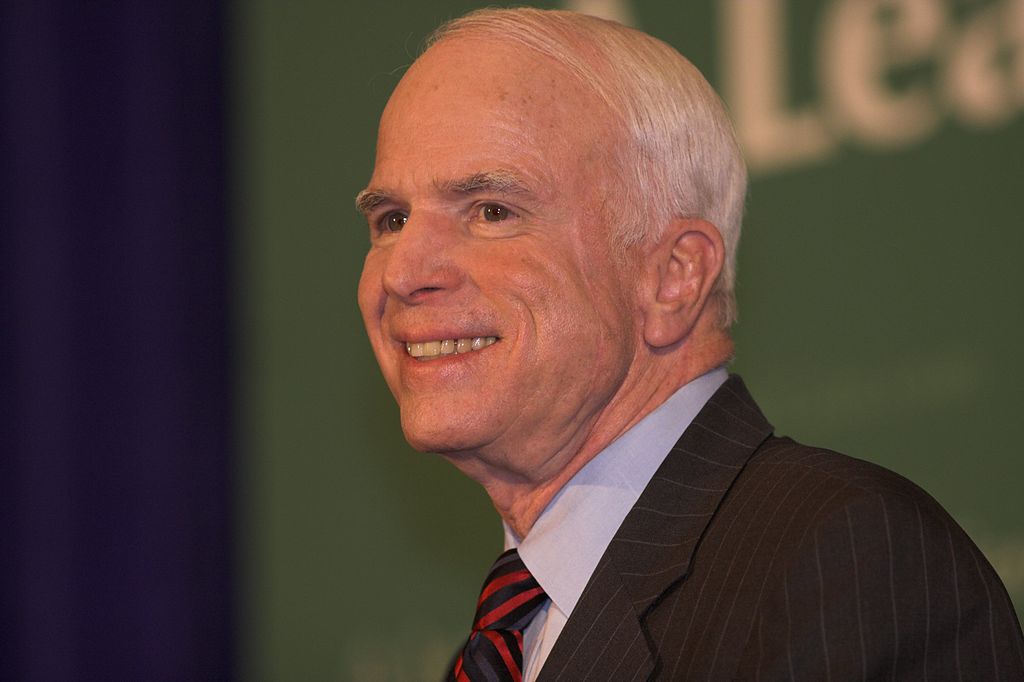Originally published at MintPress News.
MINNEAPOLIS — Modern American politicians are often criticized for their willingness to bow to popular opinion, changing their professed beliefs from moment to moment based on what they think the public wants to hear. Yet one senator rises above all that through his unabashed love of war — a stance that’s remained consistent regardless of what party sits in the White House and how many civilian lives could hang in the balance.
That senator is John McCain, a Republican from Arizona, who currently leads the Senate Armed Services Committee. In February, as the White House asked for authorization to use military force against the so-called Islamic State of Iraq and Syria (ISIS), McCain appeared on NBC’s “Meet the Press” in support of the idea that there should be no limits on the president’s ability to make war.
“I think we should not restrain the president of the United States,” he said on the show, explaining that to do so would be “unconstitutional and frankly leads to 535 commander-in-chiefs.”
McCain has ensured U.S. support for all sides of the conflict in the Middle East. In 2012, he joined South Carolina Sen. Lindsey Graham in calling on America to arm the Syrian rebels, many of whom later joined ISIS. Years after helping arm the Syrian rebels, he admitted to Sean Hannity that he’d met ISIS and knew them “intimately.”
McCain is such a passionate supporter of war that even other senators grow tired of his diatribes, according to Dana Milbank. Writing last year in the Washington Post, Milbank described the reaction of McCain’s colleagues to a speech in favor of renewed airstrikes on Iraq:
“Now, Madam President, there’s a need for immediate action,” McCain inveighed.
But the only immediate action undertaken by Madam President — Sen. Heidi Heitkamp (D-N.D.), doing a shift in the presiding officer’s chair — was to read an e-mail on her phone, which she held in her lap.
“There is wholesale killing and slaughter going on, and it will get worse every single day,” McCain pleaded.
Elsewhere in the chamber, Sen. Barbara Mikulski (D-Md.) was scrolling on her phone, and Sen. Richard Shelby (R-Ala.) yawned and rubbed his eyes.
Although he’s spoken against torture, McCain’s been a war-hawk since taking office in 1987. Below are some examples of his passionate support for war, invasion, or otherwise sharing the violent fruits of American democracy abroad:
- Afghanistan: Late last year, McCain opposed President Barack Obama’s plans to formally end the 13-year war in Afghanistan, warning that prematurely ending hostilities would “not just be a tragedy for the Afghan people; it would put the American people in far greater danger.”
- Iran: In March, McCain, an ally of Israeli Prime Minister Benjamin Netanyahu, warned, against all evidence to the contrary, that U.S. peace with Iran poses a direct threat to Israel’s existence.
- Iraq: After supporting the first invasion of Iraq, which deposed Saddam Hussein and destabilized the region, McCain continued to advocate for more U.S. involvement in the region after ISIS took advantage of the resulting chaos to gain power. “We need more boots on the ground,” he declared in January, demanding the deployment of thousands of troops.
- Libya: In April 2011, McCain called for direct military aid that he claimed would facilitate an “end of Gadhafi’s rule and the beginning of a peaceful and inclusive transition to democracy.” While U.S. aid did bring about the death of Libyan leader Moammar Gadhafi, the country is now held by warring rebel factions and serves as a stronghold for ISIS.
- Nigeria: McCain sparked a minor international incident in April of last year, when he insulted Goodluck Jonathan, then the nation’s president, in his eagerness for military intervention against Boko Haram.
- North Korea: Though security experts cast doubt on allegations that North Korea hacked Sony, to McCain it was another excuse to call for military intervention. “It’s more than vandalism. It’s a new form of warfare that we’re involved in and we need to react and we need to react vigorously,” he said during an appearance on CNN in December.
- Syria: McCain took a direct hand in the Syrian conflict when he secretly visited to show his support for anti-Assad forces in 2013. He’s repeatedly spoken in favor of airstrikes in the country, often citing discredited evidence that he says supports Assad’s use of chemical weapons.
- Ukraine: McCain involved himself even more intimately in the overthrow of Ukraine’s elected government, offering support to the neo-Nazi and anti-Semitic nationalist party Svoboda by appearing alongside them at Euromaidan rallies last year.
Indeed, the senator from Arizona is among Congress’ most reliable voices: No matter what nation America plans to bomb next, McCain will be among the first to voice his support for military intervention.
